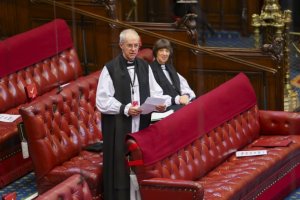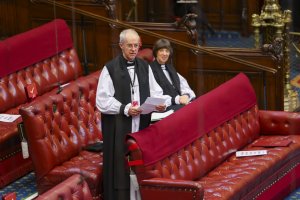Twenty-six Anglican bishops are given seats as of right in the House of Lords.
The UK is the only western democracy which reserves seats for clerics in its legislature.
This is unfair, undemocratic and undesirable. It's time to abolish the bishops' bench.
Two archbishops and 24 bishops of the Church of England currently have automatic seats in the House of Lords. They are sometimes known as 'the lords spiritual'.
We campaign for a secular upper house with no specific religious representation, whether of Christian denominations or any other faiths. In a secular state no religion or its leaders should have a privileged role in the legislature.
Any serious proposals to reform the House of Lords must address the unjustified privilege of the bishops' bench.
62% of Brits think no religious clerics should have an automatic right to seats in the House of Lords.
After over a century of decline in religious attendance in Britain, the claim that bishops — or any other religious representatives — speak for any significant constituency is not warranted. Less than 1% of the British population now attend Anglican services on the average Sunday.
In addition, the presence of religious leaders amounts to double representation of religious interests as many peers already identify themselves as being religiously motivated. Retired religious leaders are often appointed as peers.
Bishops do not have any "special moral insight" unavailable to everybody else. The idea that bishops or any other 'religious leaders' have any monopoly on issues of morality is offensive to many non-religious citizens. Those who profess no religion are no less capable of making moral and ethical judgements.
In an increasingly secular society the role of religious representatives in our legislature has become irrelevant, and has stood in the way of progressive legislation.
Take action!
1. Write to your MP
Ask your MP to help end the archaic, unfair and undemocratic bishops’ bench in the House of Lords.
2. Share your story
Tell us why you support this campaign, and how you are personally affected by the issue. You can also let us know if you would like assistance with a particular issue.
3. Join the National Secular Society
Become a member of the National Secular Society today! Together, we can separate religion and state for greater freedom and fairness.
Latest updates
Over 60% Brits think bishops have no place in parliament
Posted: Tue, 7 Jun 2022 11:48
Most Brits think bishops should not have automatic seats in parliament, new figures confirm.
A survey of 1,631 UK adults in April found 62% disagreed with the statement: "Do you think that Bishops should still have a place in Parliament in a modern democracy?"
The survey by Techne UK found only 19% agreed with the statement, while the remaining 19% answered "Don't know".
Younger people were even more likely to oppose bishops in the House of Lords, with 70% of 18-34 year olds and 71% of 35-44 year olds responding that bishops should have no place in parliament.
The results are consistent with previous surveys on the subject. In a YouGov survey last year, over 50% said the Lords should cease to reserve places for C of E bishops.
Campaign to scrap the bishops' bench
Twenty-six places in the Lords are reserved for C of E bishops and archbishops as of right. The National Secular Society argues for the end of the 'bishops' bench' as part of its campaigning to separate church and state.
The bishops in parliament, known as 'Lords Spiritual', are able to debate and vote on all legislation. They regularly oppose policies which they believe contravene Anglican doctrine, including reforming the law on assisted dying and easier access to abortion medication.
The UK is unique among Western democracies in giving representatives of religious groups automatic seats in its legislature.
In 2020 the NSS helped to draft a bill to end C of E bishops' automatic right to sit in the Lords.
NSS head of policy and research Megan Manson said: "Polling consistently shows the bishops' bench is very unpopular with the public, who rightly want to see a more democratic House of Lords with no special privileges granted to religious leaders.
"This latest poll confirms it is high time we abolished this anachronism.
"Scrapping the bishops' bench is right in principle. Granting seats in our upper house to clerics on the basis of their religious membership is unfair, undemocratic and unequal.
"It's also a symptom of the underlying issue: the lack of church-state separation in our constitution. Disestablishing the Church of England is the only way to guarantee true equality for all UK citizens, whatever their religion or belief."
With special thanks to Clive D. Field's blog for the information.
Image: Copyright House of Lords 2021 / Photography by Roger Harris
Reducing bishops in House of Lords ‘inevitable’, says CofE paper
Posted: Mon, 14 Feb 2022 15:37
The Church of England is open to reducing the number of bishops in a reformed House of Lords but not scrapping them entirely, a briefing suggests.
The confidential briefing paper, published in Church Times, says there is a consensus among bishops in the House of Lords that reform of the House is "inevitable" and that the CofE "should seek to shape" reforms that will "impinge" on bishops.
This implies "a reduction in the number of Lords Spiritual", the briefing says.
The Lords Spiritual are members of the bishops' bench in the House of Lords. The bishops' bench consists of 26 Church of England bishops who are automatically appointed to the House. The UK is unique among Western democracies in giving representatives of religious groups automatic seats in its legislature.
The Bishopric of Manchester Act (1847) set the number of Bishops entitled to sit in the House of Lords at 26.
The confidential briefing by the Archbishops of Canterbury and York and the Bishop of London was presented to the bishops' membership body, the House of Bishops, in September. It draws on interviews with "key stakeholders", including all 42 diocesan bishops.
The briefing outlines proposed changes to the CofE's management to address a number of challenges faced by the church, including funding. Two thirds of dioceses are operating on deficit budgets and the majority of dioceses are not capable of sustaining themselves without "more mutual and central funding".
The briefing says the proposals align with calls for a "simpler, humbler and bolder church" that must be "prepared to accept radical change".
However, the briefing does not recommend the complete abolition of the bishops' bench. It says the Lords Spiritual provide "high value" in being able to bring CofE "values and influence" in the public square. It also says there is a "strong case to put further resource" into the Church of England's parliamentary unit to "provide adequate support" for the bishops.
The briefing also refers to "tension" between bishops managing a "national role" and leading a diocese.
NSS head of policy and research Megan Manson said: "While reducing the number of bishops in the House of Lords would be welcome, it's clear the CofE has no intention of scrapping the bishops' bench entirely and ending its disproportionate influence in our democracy.
"The Church says it wants to be simpler and humbler. But increasing funding for the bishops' bench, as the briefing suggest, is entirely at odds with goal. A humble church is not one that seeks to impose its religion on society by wielding parliamentary power.
"The Church recognises the tensions in trying to serve local Anglican communities and acting as the state religion. It also says it needs to accept radical change.
"An obvious radical change which would eliminate those tensions and help it dedicate its resources to its own parishioners would be to disentangle church from state. And this should start with the complete withdrawal of bishops appointed to our legislature."
Image: Copyright House of Lords 2021 / Photography by Roger Harris




